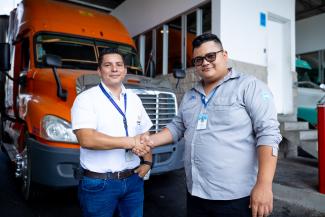Press Release
With an investment of $18.8 million, the U.S . Government promoted the economic integration of Guatemala, Honduras and El Salvador to reduce import prices and increase exports. The U.S., through USAID, and its regional partners celebrated the achievements of the Regional Trade Facilitation and Border Management Project, which promoted economic integration and compliance with Trade Facilitation Agreements established before the World Trade Organization. The project focused on customs union and trade facilitation, while maintaining border crossing security and control.
U.S. Ambassador William Duncan and Secretary General of the Secretariat for Central American Economic Integration (SIECA) Francisco Lima Mena presided over the celebration of the six-year project achievements.
Main project achievements include:
- Over 1,400 companies received technical assistance related to foreign trade and more than 2,800 people were trained in trade facilitation.
- 39% reduction in the time and cost of importing goods at the borders, a 36% reduction in the time required for physical inspections at key border posts, and a 50% reduction in the number of physical documents requested, eliminating the need for more than one million hard copies. In addition, the time required for sanitary procedures was reduced by 74%.
- At the regional level, USAID, together with SIECA, held three editions of the “Integrated Border Management Academy,” strengthening the capacities of 70 officials from border management and control institutions in Guatemala, Honduras, and El Salvador. A total of 9,316 hours of training were provided on topics such as economic integration, risk management and trade facilitation. These officials are now leaders who promote more coordinated management and offer a more efficient service at border crossings, expediting the passage of goods and people.
- Promotion in El Salvador of the Customs Union process with Guatemala and Honduras through the training of over 150 businesspeople and 280 government officials so that they will be better prepared when this important customs process begins. In addition, the Superintendency of Health Regulation received support with a system that reduces registration times for pharmaceutical products, medical devices and chemical products, benefiting more than 17,000 users in laboratories, pharmacies, drugstores and other related sectors. USAID also helped 34 companies obtain their “Authorized Economic Operator” (AEO, also known in El Salvador as “Trusted Operator”) certification, of which seven have already been certified by the General Customs Directorate.
- In Guatemala, USAID worked hand in hand with business associations to strengthen the AEO program, training 54 companies, of which 27 received assistance in obtaining their AEO certification. Thirteen officials from the Superintendency of Tax Administration were also trained to promote safe practices in the international supply chain.
- In Honduras, the “Coordinated Inspection System” was implemented between the National Agrifood Health and Quality Service (SENASA) and Honduran Customs, the only system in the region that improves the control of goods, providing better service to users. These efforts translate into a 45% time reduction in the release of goods and an estimated savings of $9 million per year for the private sector. In order to streamline customs processes, the project promoted the “Paperless Customs” initiative, in which close to one million documents are submitted digitally, eliminating the use of paper.
These achievements were possible thanks to the collaboration between USAID and various public, private and trade institutions in the three countries, including SIECA; the Consultative Committee for Economic Integration (CCIE); the Ministries of Economy, Agriculture and Livestock, and Health; Customs; private sector companies, and organizations related to trade facilitation.

